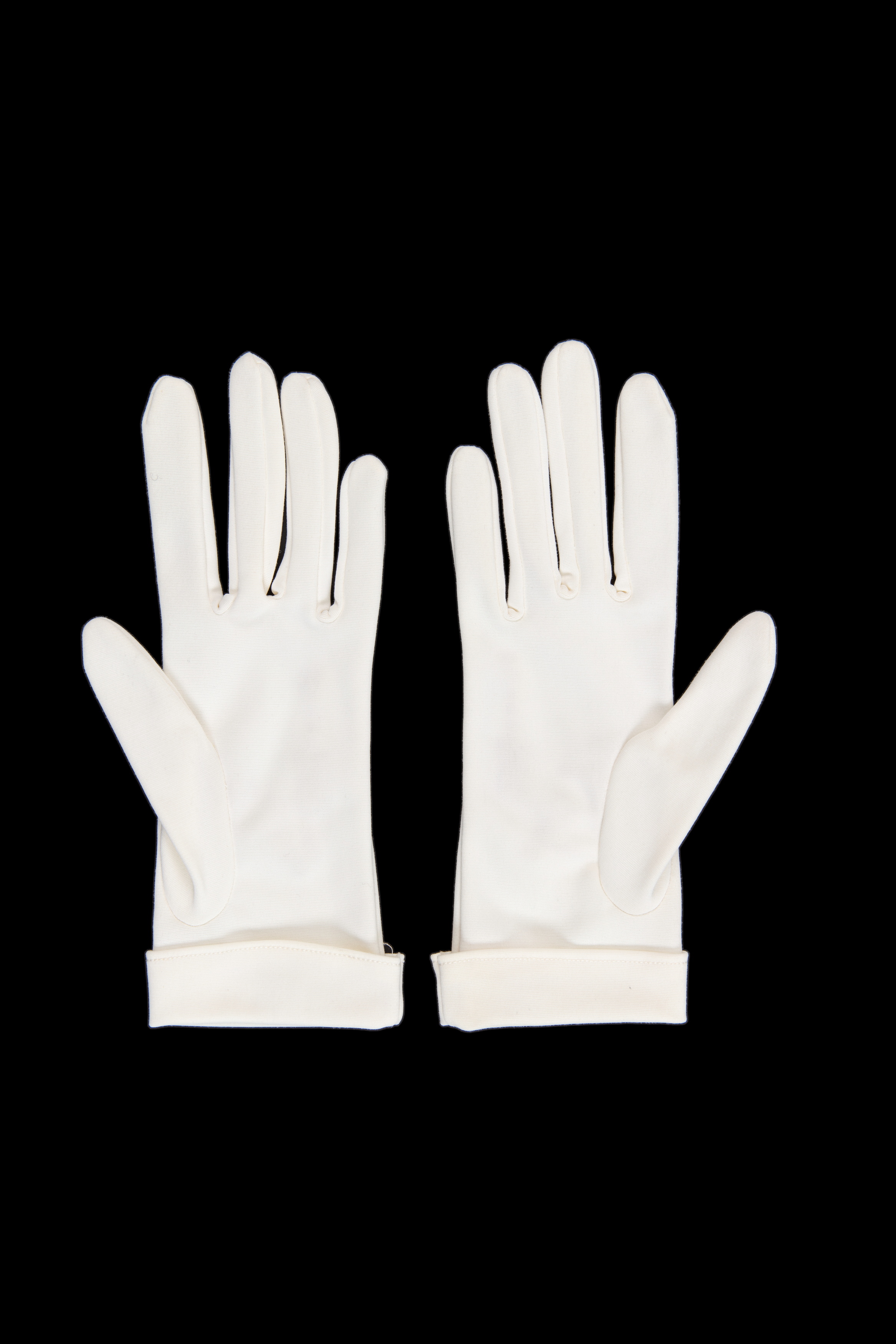Pair of gloves from the Col Joye fan club
Object No. 98/132/2
This pair of gloves has significance because it was made as a souvenir of Col Joye and owned by him for many years. The music of Bill Haley and Elvis Presley inspired the other great pioneer of Australian rock 'n' roll, Col Joye, just as it had inspired Johnny O'Keefe. Born Colin Frederick Jacobsen, he and his brothers saw Haley's movie Rock around the clock a dozen times. The reason for the movie marathon was to sketch the shape of the solid-bodied guitars used by Haley's band the Comets, so that younger brother Keith could build their own guitars and bass. Before this Kevin (Col's piano-playing older brother) had a three-piece band playing at weddings, cabarets etc. Col joined this band. Along with drummer John Bogie and guitarist Dave Bridge (who worked at a wholesale jewellers with Col), they made up the KJ Quintet. With their home-made guitars and bass, plus piano and drums, they then added Laurie Irwin on saxophone and began playing at dances in and around Sydney. Another Jacobsen brother, Keith, joined the band on bass guitar. At their regular hotel gig at Maroubra Junction the band started to pull in large crowds. They played regularly at Police Boys' Clubs and suburban halls and began to organise their own dances at the Bankstown Capitol, where they would play to 2000 teenagers every Saturday night. Fights were common at rock 'n' roll dances. To keep the peace at their Bankstown performances a wire structure was built to contain the crowd and 17 hefty bouncers were employed. Their big break came when promoter Bill McColl saw them at the Maroubra Hotel and offered them a spot playing on his 'Jazzorama' concert in October 1957. They dressed in flash clothes (including white shoes which they painted themselves), began rehearsing frantically and searched for a new name. The band became the Joy Boys and Colin Jacobsen became Col Joye. Ken Taylor of Festival Records signed Col Joye and released his first record in mid 1958. However Festival had to wait until Joye's fourth release before getting their first national hit. The romantic rock ballad 'Bye Bye Baby' was recorded when Joye had a bad cold, and his wheezing and sniffing can still be heard on the disc. Released as Joye's profile was soaring, due to his first appearance on one of Lee Gordon's 'Big Shows', 'Bye Bye Baby' was a smash. A stack of hits followed. 'Oh Yeah Uh Huh' became the first rock song recorded and produced in Australia to become a national No 1 hit. 1960 saw the release of Col's first LP, Songs that Rocked the Stadium. Recording conditions at Festival were primitive: an echo effect was achieved by piping the vocal into a toilet room and on 'Oh Yeah Uh Huh' John Bogie tapped out the 'drum' beat on a typewriter. Much loved by his fans, Joye employed two full-time staff to answer his mail. He cultivated a clean-cut, boy-next-door image, wore a friendly smile and seemed genuinely unassuming and modest. He had a broader appeal than the hard-rocking, sometimes abrasive Johnny O'Keefe. Kevin Jacobsen made sure that Col appeared regularly and exclusively on Bandstand, which gradually cemented his position as one of Australia's most popular TV personalities. His high TV profile ensured good record sales, and by 1963 he had released 20 singles, 24 EPs and 19 LPs. But music was rapidly changing. The popularity of the Beatles and other British groups eclipsed Joye's profile, and the mid 1960s were lean years in terms of having hit records, just as they were for Johnny O'Keefe and Lonnie Lee. Regarded by many fans as unfashionable during this period, Joye managed to maintain a profile as an entertainer and to develop a career in the business side of the music industry. Showing a keen business sense, the Jacobsen brothers branched out into music publishing and booking-agency work. Kevin Jacobsen remains a major entrepreneur. Col established his own record label (ATA) and in 1973 scored a huge hit with the country flavoured 'Heaven is My Woman's Love'. He continued to entertain audiences although temporarily sidelined by an accident in 1990. He appeared in the 'Long Way to the Top' concerts in 2002.
Loading...
Summary
Object Statement
Gloves (pair), womens, Col Joye fan club souvenir, nylon, Muller Gloves, New South Wales, Australia, 1958-1961, owned by Col Joye
Physical Description
Gloves (pair), womens, Col Joye fan club souvenir, nylon, Muller Gloves, New South Wales, Australia, 1958-1961, owned by Col Joye Pair of ladies gloves made of white nylon with the name 'Col Joye' and an image of a guitar embroidered in red and white cotton on back of the hand area of each glove.
PRODUCTION
Notes
Designer unknown Manufactured by Muller Gloves.
HISTORY
Notes
Made for the Col Joye fan club. Kept by Col Joye for his personal collection. Lent by Col Joye to the Powerhouse Museum in 1993 for the Real Wild Child exhibition.
SOURCE
Credit Line
Gift of Col Joye, 1998
Acquisition Date
20 October 1998

Copyright for the above image is held by the Powerhouse and may be subject to third-party copyright restrictions. Please submit an Image Licensing Enquiry for information regarding reproduction, copyright and fees. Text is released under Attribution-Non Commercial-No Derivative licence.
Image Licensing Enquiry
Object Enquiry

